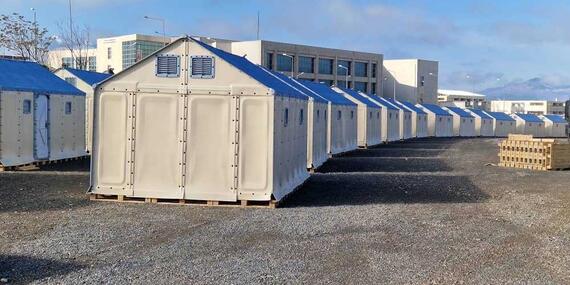Restoring dignity: Improving shelter conditions in quake-hit Kahramanmaraş

by Alimbek Tashtankulov
More than a month after two deadly earthquakes struck Kahramanmaraş, one of southern Türkiye’s worst-hit provinces, survivors are struggling to find shelter that can protect them from harsh weather conditions. The European Union (EU) and the Swedish Civil Contingencies Agency (MSB) are helping to provide this through 500 relief housing units, which aim to offer comfortable and dignified living conditions to about 2,500 people displaced by the earthquakes.
Some 150 units have been built on the grounds of Kahramanmaraş Sütçü İmam University, and the Disaster and Emergency Management Presidency of Türkiye (AFAD) will identify locations for the remaining 350 units. Each unit can accommodate up to five people and will be furnished with beds, mattresses, bedsheets, two electric heaters and a fan.
Andreas Häggkvist, MSB’s Operations Manager in the city, explains: “What we have installed so far is phase 1, and families can move in when water and sanitation is available at the site. Phase 2 entails installing wooden frames and insulation material that is covered with tarpaulins, which can protect from the cold in winter and heat in summer.”
The EU donated the 500 units to AFAD through its rescEU reserves. MSB ships and sets up the units, which are designed for long-term use (1-3 years), and it is training a team from the Turkish military, who will build the remaining 350 units after MSB leaves Türkiye by the end of March. Kahramanmaraş Water and Sewage Administration staff are installing water and sanitation infrastructure, including latrines and pipes.
The International Organization for Migration reports that the earthquakes in Türkiye displaced more than 2.7 million people. Many of these people are living in temporary settlements, half of which are classified as informal. Due to the scale of the crisis, these temporary settlements lack access to safe and dignified water and sanitation, health care and other essential services. Tents are the main form of shelter, despite temperatures dropping to below 10°C at night.
Sergio Da Silva, team leader for OCHA’s earthquake response in the city, explains: “We visited a few of the locations in Çağlayancerit district in Kahramanmaraş, and many people told us that some kind of shelter strong enough to withstand wind, rain and cold is one of their main needs. We are working with AFAD and local authorities to try and channel the efforts of international humanitarian organizations to complement the Government response in the best way, including for shelter and other assistance.”
The UN and humanitarian partners are mobilizing emergency teams and scaling up relief operations in Türkiye, in support of the Government’s response, and providing life-saving relief, including food, medical supplies, shelter, winter supplies, and hygiene and dignity kits.
On 16 February, the UN launched a Flash Appeal for US$1 billion to assist 5.2 million people directly affected by the earthquakes. As of 15 March, the appeal is only 13.8 per cent funded ($139.2 million).
